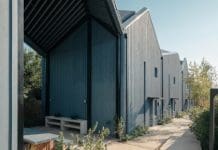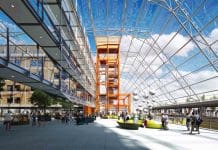The pandemic has changed the way we work, travel and interact – and cities need to change too to avoid becoming ghost towns. Dr David Cleevely, chair of the Cambridge Ahead NECE project, discusses new research that examines how the city can experiment with new urban design principles and transport
Two years of pandemic have accelerated changes that might otherwise have taken 20 or more years, including urban design principles. The New Era for the Cambridge Economy (NECE) research focused on Cambridge, but its findings apply widely.
Our report highlights changes in the way we work, travel and interact and reveals that expectations have changed about the environment in which we live. There are significant implications for how we plan urban environments and the systems that support them.
The most immediate and obvious change is the move to hybrid working. The evidence is increasingly telling us that those knowledge-intensive workers in particular who can work flexibly might spend two to three days away from the workplace each week. Our survey of business leaders at the end of 2021 suggested that these workers were spending an average of 4.7 days per week in the office pre-pandemic, which fell to 2.5 days. The expectation for the future, from managers, is that this will level out at around three days per week in the office.
In Greater Cambridge, knowledge-intensive workers make up nearly half of the workforce, which makes the city region an obvious place to begin understanding the impact of this shift.
Where will people choose to live, work and enjoy their leisure?
We will see less mass tidal movements in the morning and evening rush hours, especially at each end of the week. That’s good news for the economics of mass transit in the long run. But right now, things look bad.
Car usage has boomed and public transport is lagging. We need to see beyond the next 5-10 years to mass transit systems with smaller vehicles that behave more like taxis on their own and trains when they are together. Bicycles, especially e-bikes, will play a much greater role.
The concept of the 15-minute city is increasingly interesting for rapidly growing, congested cities. Cambridge has already developed important new centres in the north-west, north-east and south. As in Paris, which is leading the way in applying the concept, we should be enabling people to enjoy living, working and leisure in these centres without the need to make frequent long journeys. Travel then may not all flow in and out of the core as was previously the case, and movement within the city would be less dependent on reaching the historical centre.
This means rethinking how transport and the urban environment develop together. We advocate that our city should be taking bold action through progressive charging to reduce private car usage so that funding and road space can be prioritised for public and active travel. Autonomous public transport and emerging forms of micro-mobility like e-scooters and e-bikes, for individuals and for goods, will be part of this new model for mass transit.

New urban design principles must be considered
Correspondingly, urban designers, developers and employers will need to work harder to create spaces that draw knowledge workers together if an individual is free to choose whether or not to come into the office. Perhaps we should stop thinking about offices as spaces where tasks are carried out but as places where people come to connect and interact. The resulting sparks of innovation are vital to any knowledge economy over the long-term.
Our business survey showed that while remote working has led to greater interactions in a team, interactions within organisations, between businesses, and across sectors are all down. In Cambridge, there is a risk that, as the city grows, the science parks and campuses that serve that growth do so in a way that excludes social interaction and, as a result, the spark of innovation dies. This is too important to be left to chance and serendipity. Spaces need to be designed to be open, porous and inclusive so that local communities feel welcome there and part of the city’s advancing economy. Mixed-use developments will play a part in this, as innovation districts bring commercial, residential and public spaces together.
Homogeneity in large developments is over. Taking these trends alongside the scarcity of space in many cities, this will mean maximising our use of high quality and high-density development and there are an increasing number of examples in cities around the world where this has been achieved. In the UK, the King’s Cross development is one such leading example.
Marking a new era by setting new urban design principles
How does all of this hang together in a city with many different institutions across the public and private sector that play an active role in development?
We believe that the new era should be defined by city leaders focusing on a new set of urban design principles to guide us to define success. The wealth economy framework developed by the Bennett Institute advocates that it is counterproductive to focus exclusively on economic value in and of itself; if a place prioritises keeping its “stock” of six capitals in good order, then economic value will be generated as an outcome.
These six capitals are natural, social, human, knowledge, institutional and physical. This approach leads to diversity rather than homogeneity and to environments that are on a human scale. Cities can adopt this progressive approach to measuring growth in a more sustainable and inclusive way, and there are some brilliant examples of major businesses doing so.
Cambridge is a city that is known the world over for experi-mentation. We need to adopt that spirit of experimentation at a city-wide level. What we want to see next is government to look to cities like Cambridge to be a testbed for new transport systems, new urban design principles, new measures of success – and for exciting and dynamic examples of this to be conveyed to the world as we do so.
Dr David Cleevely

Chair, New Era for the Cambridge Economy
Tel: +44 (0)7761 511 766
Twitter: @CambAhead
LinkedIn: Cambridge Ahead
YouTube: cambridgeahead

















